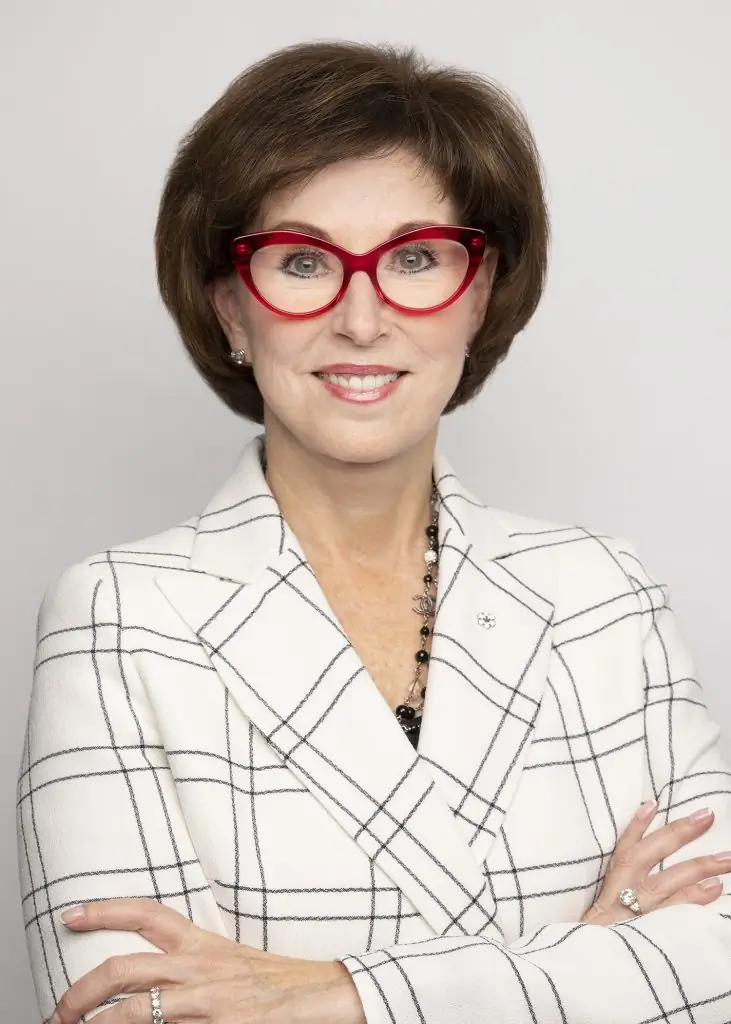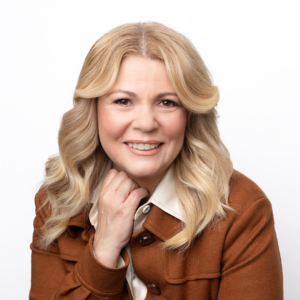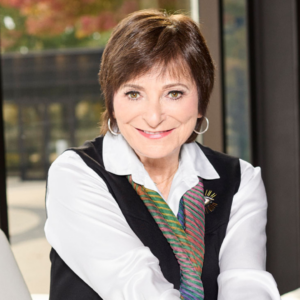Kathleen Taylor – Former Chair of Royal Bank of Canada and Chancellor of York University
Katie Taylor is recognized as one of the most influential women in corporate Canada. She is the Chair of the Board at RBC and the first woman to hold this role at a major Canadian bank. In Katie’s remarkable professional journey, she has served as the President and CEO of Four Seasons Hotels and Resorts and has been a member of several boards including The Canada Pension Plan Investments Board and SickKids Foundation. Katie has received numerous awards including the Order of Canada.
In this episode of The Honest Talk, Jen and Catherine speak with Katie Taylor about women’s underrepresentation on corporate boards and what needs to be done to break the barrier. She also talks about recognizing and seizing opportunities when they come. As a successful corporate leader and the mother of three children, Katie shares insights on how she manages her work-life balance. Katie also discusses her partner’s role in her life and the importance of investing in one’s own future. Last but not least, she offers important advice to THT listeners about deciding for yourself, and not for others.
Note: This transcript has been edited for clarity and length.

Catherine Clark: We’d like to start by chatting about your role as chair of the board at RBC, because we still exist in an environment where women are underrepresented on corporate boards. Your appointment as chair of one of the country’s biggest banks was a big deal. From your perspective, what has changed for women on boards in the past five to 10 years?
Katie Taylor: It’s been a big focus of the women’s diversity movement. We’ve been talking about women on boards for as long as I’ve been a woman serving on boards. When I joined my first board, I was the only woman, and when I joined RBC way back in 2001, I was one of three women on the board. And that would have been a small percentage. We have made some good progress, I would say. But we still have so much work to do. There are still lots of companies where women are underrepresented.
One thing you often hear is, “We haven’t been able to find a woman who would be suitable for our board. We haven’t been able to source a woman who has the competencies we need for our board.” I find all of this a bit disingenuous, because when you look at Canada’s largest companies – RBC would be a great example – the representation of women in our largest companies is actually very good. So you then would ask yourself the question, if these huge, complicated, multistakeholder enterprises are able to find a sufficient complement of women to create a very diverse and thought-diverse board, how can that not be also true for those in smaller and perhaps less complicated industries? Sometimes it’s industry experience that holds people back, sometimes it’s network. So moving outside our network and utilizing other networks, whether those be professional search firms or professional women on board associations that have access to a much broader range of names. So, I would say in summary, we’ve made some progress, but we still have lots of work to do.
Jennifer Stewart: How do we do that work? How do we actually move the needle?
Katie Taylor: I think it actually starts with women’s representation. Women often call me and say. “I’m being asked to join this board. I think they’re only calling me because I’m a woman.” My advice to them was okay, well then take that board. And your next job is to make sure that the next director and the next director after that is also a woman, so that you’re moving the organization along a continuum, where it can actually have access to the thought diversity and thought leadership that you’re trying to get yourself to.
When I think back on my board work, I think I was chosen in almost every case on account of the fact that I was a woman. It didn’t hurt that I was a high-level executive in a global company. That was probably the key capacity. But being a woman was something that all of these boards were also looking for. And I didn’t consider that a negative. I considered it a positive, because then I could get onto that board and become a catalyst for even further change.
Catherine Clark: Did you set out with the ambition to have a career which featured such increasing roles of importance? Or did you simply accept new opportunities?
Katie Taylor: Definitely the latter. I’m from Oshawa, Ontario, which, back in the days when I grew up there, was rural and blue-collar. Just about everybody in our town worked in the auto industry, and very few in my high school went to university. So the notion that I would someday be doing all the things I’m doing is almost unbelievable when you think about where I started, but education was the great transformation.
I came to Toronto and did an undergraduate degree at the University of Toronto and after four years realized all I wanted to do was find the longest postgraduate degree in existence. That ended up being
A joint law-business degree at Osgood Schulich, which was essentially four more years in the university setting and then two more years of apprenticeship. I didn’t really start out wanting to be a lawyer; I didn’t really know anything about business. But I was attracted to the idea of continued learning and exploration.
When I left there, I took a job at a law firm in downtown Toronto and spent a couple of years there as a corporate securities lawyer. It was a segment of the law that wasn’t populated by very many women. After Black Monday, 1987, I convinced my bosses to send me off to the Ontario Securities Commission, where I did US economy for a year. Then my former mentor who had gone to become the general counsel for Four Seasons phoned me and said, “I’m looking for a Number 2. Would you be interested?”
I thought I would do that for two, three years, learn what it’s like to be in house at a company and go on from there. It was an exciting proposition because Four Seasons was just starting its global expansion program, and part of my job was supposed to be to support the deal teams as they went around the world. Then my boss left to become an investment banker, and my boss’s boss said, “Well, we’ll give her a shot.” I took on more and more responsibility. Scope was the path to greater and greater success.
Ultimately, I became the president at Four Seasons and went on to be CEO. There was no grand plan. There was no big ambition. Just as I went along, I’d say to myself, “Yes, I can do more. I can contribute more. I can make a bigger value proposition for the organization if I take on this additional area of responsibility.” So it was very incremental.
Jennifer Stewart: I find that really interesting because so much we hear about saying no to things and setting up personal boundaries as women so that you can have a fully integrated life. But I always think it’s really interesting to say yes to opportunities if they serve you, or serve others, as they come along. So that’s really fascinating that it wasn’t this grand ambitious plan to rise to the executive ranks, but it was you being open to those opportunities as they arose.
Katie Taylor: Some of the best advice on any of this I got was from our founder. Every time I took on a new big step, he would say to me, “It’s not only you that’s getting a promotion, your whole family’s getting a promotion: your housekeeper, your husband, your children, your extended family, everybody’s going to have to adjust to your new role.” And it was a fantastic insight, because it meant that I would be very thoughtful about the foundational elements of life outside the office that essentially enabled my career. All of those stars have to align if that taking on more, doing more, devoting more time to a career is going to actually work in the long run, in the integration of your work and non-work life.
Jennifer Stewart: You have three children. The obvious question is how did you balance it all with such a progressive career?
Katie Taylor: I always start the answer to this question with the disclaimer that in fact, there isn’t any balance and there wasn’t any for me. I’ve always felt it’s easier to deal with things if you can understand the complexities of them, if you start with the fact that there is no balance, there is only the constant striving for the appearance of balance.
As your career continues to expand, and your family continues to become more complex, the thing you have to focus on is what I call daily conscious choices. We have to be making constant adjustments. If you’ve done the tree pose in yoga, where the actual objective is total balance and stillness, you can recognize how extremely difficult that is with every muscle and fiber of your being trying to achieve the pose. And this work-life integration piece for me is much the same. What adjustments do I have to make today in order to deal with the complexities that I face today, in order to be around to enjoy both a great family life and a great career tomorrow?
Catherine Clark: A lot of women spend a lot of time trying to fit into someone else’s mold. Did you face pushback from others around you because of that?
Katie Taylor: I think you face pushback as a woman all the time. You know, Sheryl Sandberg has a terrific thing she did at Davos many years ago. She said, “Stand up if anyone’s ever asked you if you should really be working.” Of course, about 100% of the women stood up and none of the men, and then she asked the women to stay standing if the person who had said that to them was another woman, and 75% of them stayed standing. And so when you think about the external pressure, and the stereotype that comes around, motherhood, and being a perfect wife, and being a perfect homemaker, the pressure is always there. When I was going through it, I had the unbelievable luck to not be experiencing life through social media. It really did give us the freedom to sort of organize the way we wanted to do things in our own way.
Remember, I’m in my mid-60s. It’s a very long life, ladies. Children are born and they are raised and they go off to college. Then you probably still have another 30 years of active working and living maybe even longer for many of us. And so you need to be thinking about life very holistically along the continuum and constantly investing in your own future.
Jennifer Stewart: A lot of the women that we’ve spoken to have talked about the huge benefits to their career, into their life of having a supportive spouse or partner. What’s been the secret to your own multi-decade marriage?
Katie Taylor: It’s a very supportive relationship. I met my husband when I was in my early 30s. He’s a bit older than me; he was in his early 40s. So, his career was in a slightly different place. But by then I was an active working executive and that’s what he was meeting for the first time, and ultimately that’s the woman he fell in love with was this person who wanted to have a career. He could see that the blend of work and family really energized me and kept me active and engaged and intellectually stimulated and ultimately was incredibly supportive.
Constant communication with your life partner. There is no substitute for the time you spend together, talking about your ambitions, talking about the things that aren’t working.
Catherine Clark: I’d love to talk about financial independence, because you have spoken about your belief that women should always try to maintain some element of financial independence. That’s not easy. What steps can women take to ensure that they do have some financial security?
Katie Taylor: Having a decided view on how you and your life partner are going to share assets. How are you going to combine? How are you going to stay separate? What works in the overall scheme of how your family household gets managed? These are really important conversations.
Jennifer Stewart: What one piece of advice would you give to our listeners today, advice that’s helped you along your own path so far?
Katie Taylor: Chart your own path. Don’t be always looking sideways at the perfection that seems to exist in other places. Make the decisions for you and your family that are absolutely correct for you – not by somebody else’s standard, but by your standards.
I used to be asked all the time what’s the most difficult decision I have ever made, and people always wanted to hear about some difficult business negotiation or deal gone bad or challenge I had had in a different environment. But my answer was always the same: the most difficult decisions you will ever make in your life are the ones you’ll make around how to raise your family because they’re so intensely personal and we perceive them to be so consequential.
All those decisions are not only for the welfare of the kids, but for the long-term welfare of the couple. Remember you’re not trying to solve for the next two years or the next two weeks. You’re trying to solve for the next 20-30 years. You need to do it the way that’s right for your family and take on the responsibility to be the CEO of your own life, and really set out some deep ambition around what you want that to look like. When you get to my age and have a chance to look back on it, it can be extremely rewarding. It should be an extremely rewarding journey, and one that I wish everybody all the best on.






